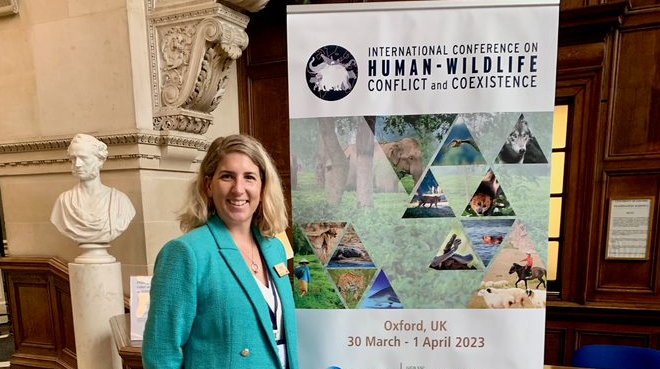2023 International Conference on Human-Wildlife Conflict and Coexistence
The largest international conference dedicated to human-wildlife conflict was recently held in Oxford, UK from 30th March – 1st April. Alongside the 700 participants from over 70 countries from across the globe was Ecosure’s Wildlife Biologist Jane Horgan, flying the flag for Ecosure in the human-wildlife conflict space. Jane reported that the conference was a roaring success, with experts from the field including government representatives, fellow consultants, academics and non-government organisation practitioners all sharing experiences, innovations, challenges and effective solutions to human-wildlife conflict.
In light of human-wildlife conflict being written into international policy framework for the first time in the UN’s Convention of Biological Diversity 2022, the conference was organised by the IUCN SSC Human-Wildlife Conflict and Coexistence Specialist Group. Co-hosted with the GEF-funded and World Bank-led Global Wildlife Program and Oxford University’s Wildlife Conservation Research Unit (WildCRU), the conference provided a forum for information exchange and fruitful discussions and workshops on a variety of topics from ecology and animal behaviour to economics, psychology, and anthropology. Jane particularly enjoyed the keynote addresses by WildCRU founder David Macdonald and current WildCRU Director Amy Dickman, as well as a panel discussion about reflecting on failures.
With practitioners working with everything from lions and sharks to gorillas and elephants, some discussions were specialised to specific species groups or geographical areas. What Jane found most intriguing was the surprising similarities between the challenges and solutions to conflict found across vastly different geographical areas and species. It is these similarities that inspired the IUCN SSC HWC Specialist Group to develop the first ever international guidelines for tackling HWC. Launched on the final day of the conference, the Guidelines outlines foundational principles and practical guidance for best practice in human-wildlife conflict mitigation. The Guidelines highlight common themes in tackling human-wildlife conflict issues, such as drivers of conflict, policy considerations, livelihoods, community and stakeholder involvement, indigenous knowledge and effectively assessing conflict and conflict mitigation.
Another general theme of the conference was the need for additional resources to be dedicated to human-wildlife conflict alleviation. The Kunming-Montreal Global Biodiversity Framework (GBF) calls for a commitment to mobilise at least $200 billion a year by 2030 to close the biodiversity financial gap, which is estimated to currently be a staggering $700 billion per year. International governments of developed countries recently committed to $5.33 billion to halt biodiversity decline in developing nations as part of the 8th phase of the Global Environment Facility (GEF), which will run from 2023 to 2026. So long as these funds filter down to practitioners on the ground, they will go a long way to helping implement effective solutions for sustainable mitigation of human-wildlife conflict.
It was exciting to see the role that consultancies are growing into in the human-wildlife conflict space. With the international community and funding bodies focusing more on the importance of human-wildlife conflict alleviation, space is being created for consultancies to assist in the implementation of mitigation programs. One example highlighted during the conference was the trial of the first national wildlife damage insurance scheme being piloted in partnership with AB Consultants and the Kenyan Government. Unable to implement the trial without assistance, the Kenyan Government brought on the consultancy to establish and help run the trial, aimed at providing quick payouts to people who have suffered financial loss due to wildlife conflict. This is a great example of how consultancies can catalyse wide-scale, effective conflict mitigation programs to promote biodiversity conservation.
Ecosure’s commitment to finding ethical and feasible solutions for human-wildlife conflict has made us a leader in this field. We strive to be the go-to source for effective human-wildlife conflict management and coexistence strategies. Our attendance at this conference equips us with the most up-to-date knowledge of innovations and developments in the field and helps strengthen networks within the human-wildlife conflict and space for improved effectiveness.


